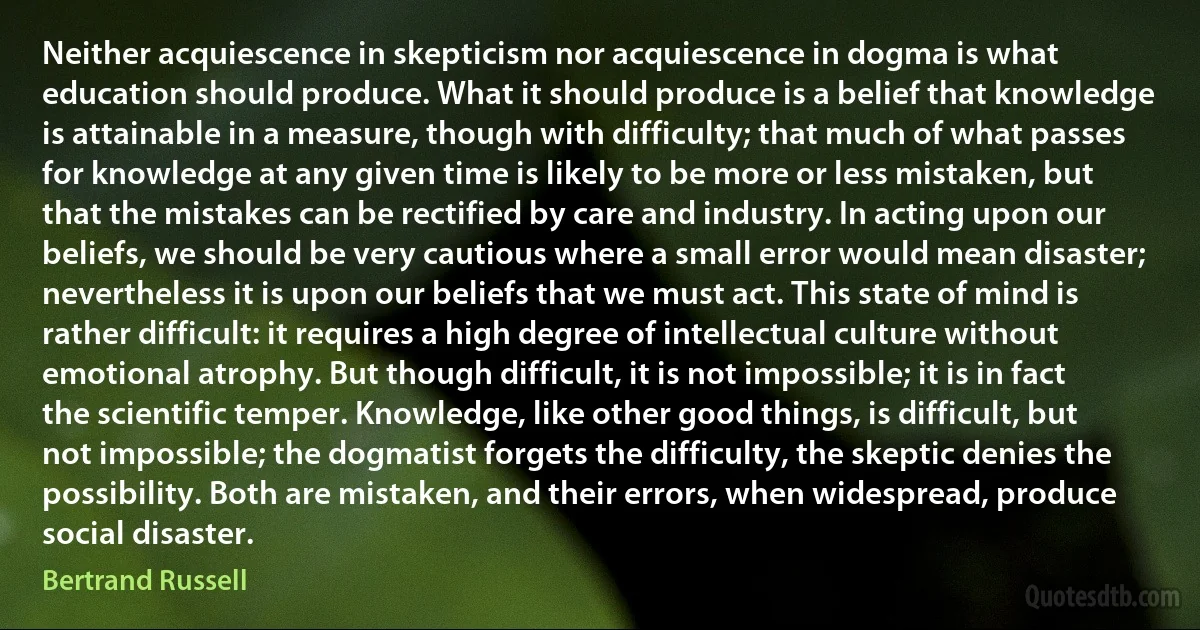
Neither acquiescence in skepticism nor acquiescence in dogma is what education should produce. What it should produce is a belief that knowledge is attainable in a measure, though with difficulty; that much of what passes for knowledge at any given time is likely to be more or less mistaken, but that the mistakes can be rectified by care and industry. In acting upon our beliefs, we should be very cautious where a small error would mean disaster; nevertheless it is upon our beliefs that we must act. This state of mind is rather difficult: it requires a high degree of intellectual culture without emotional atrophy. But though difficult, it is not impossible; it is in fact the scientific temper. Knowledge, like other good things, is difficult, but not impossible; the dogmatist forgets the difficulty, the skeptic denies the possibility. Both are mistaken, and their errors, when widespread, produce social disaster.
Bertrand RussellRelated topics
acquiescence act atrophy attainable care cautious degree difficulty dogmatist education emotional error given good high impossible industry intellectual knowledge less likely mean measure mind mistake nor possibility produce should skeptic skepticism small state temper time thingsRelated quotes
As for one-party rule, it was questioned neither by the Left Opposition nor by the Right [wing of the Communist party]. All were prisoners of their own doctrine and their own past: all had worked with a will to create the apparatus of violence that crushed them. Bukharin' s hopeless attempt to form a league with Kamenev was no more than a pitiful epilogue to his career. In November 1929 the deviationists performed a public act of penance, but even this did not save them. Stalin' s victory was complete; the collapse of the Bukharinite opposition meant the triumph of autocracy in the party and in the country. In December 1929 Stalin' s fiftieth birthday was celebrated as a major historical event, and from this point we may date the "cult of personality". Trotsky' s prophecy of 1903 had come true: party rule had become Central Committee rule, and this in turn had becorne the personal tyranny of a dictator.

Leszek Kołakowski
Why should we put up with the present evils in our society? As opposed to the society we are visualizing, the present one can be described as a diseased one. The evils are there on all levels, international and national, and even within the smaller units such as towns and families. Of course, the disease did not appear like a bolt from the blue, either yesterday, or last year. It is the result of factors that have deep roots and long lives. These consist of privations, discriminations oppressions, bigotries, hatreds, and hostilities; poverty, ignorance, hunger, and illiteracy. Each and all of these have been left to us as ar evil heritage from the past. The fundamental difference between our situation today and that of our forefathers is that now knowledge has enabled us to realize that these evils are neither natural nor inevitable in the same way as we have found that cholera or the bubonic plague are not necessary calamities.

Muhammad Reza Pahlavi
Third Theory.-According to this theory, there is nothing in the whole Universe... that is due to chance; everything is the result of will, intention, and rule. It is a matter of course that he who rules must know. The Mohametan Ashariyah adhere to this theory, notwithstanding evident absurdities implied in it. ...The Ashariyah were therefore compelled to assume that motion and rest of living beings are predestined, and that it is not in the power of a man to do a certain thing or to leave it undone. ...It follows also from this theory, that precepts are perfectly useless, since the people to whom any law is given... can neither do what they are commanded nor abstain from what they are forbidden. ...According to this theory, it must also be assumed that the actions of God have no final cause. All these absurdities are admitted by the Ashariyah for the purpose of saving this theory.

Maimonides
If you only notice human proceedings, you may observe that all who attain great power and riches, make use of either force or fraud; and what they have acquired either by deceit or violence, in order to conceal the disgraceful methods of attainment, they endeavor to sanctify with the false title of honest gains. Those who either from imprudence or want of sagacity avoid doing so, are always overwhelmed with servitude and poverty; for faithful servants are always servants, and honest men are always poor; nor do any ever escape from servitude but the bold and faithless, or from poverty, but the rapacious and fraudulent. God and nature have thrown all human fortunes into the midst of mankind; and they are thus attainable rather by rapine than by industry, by wicked actions rather than by good. Hence it is that men feed upon each other, and those who cannot defend themselves must be worried.

Niccolò Machiavelli
Whatever be the substance which takes possession of such a soul, it will produce the same result, and will change into a pretext for not conforming to any concrete purpose. If it appears as reactionary or anti-liberal it will be in order to affirm that the salvation of the State gives a right to level down all other standards, and to manhandle one's neighbour, above all if one's neighbour is an outstanding personality. But the same happens if it decides to act the revolutionary; the apparent enthusiasm for the manual worker, for the afflicted and for social justice, serves as a mask to facilitate the refusal of all obligations, such as courtesy, truthfulness and, above all, respect or esteem for superior individuals. ... As regards other kinds of Dictatorship, we have seen only too well how they flatter the mass-man, by trampling on everything that appeared to be above the common level.

José Ortega y Gasset
